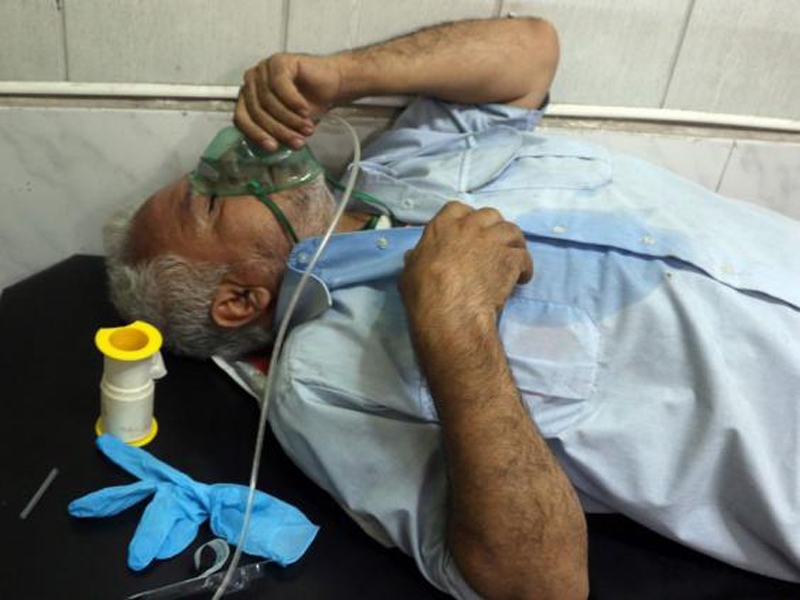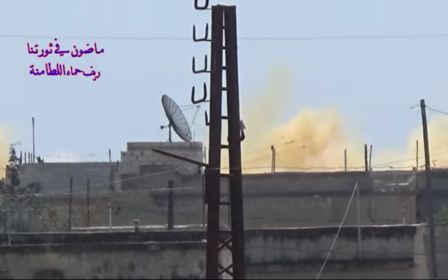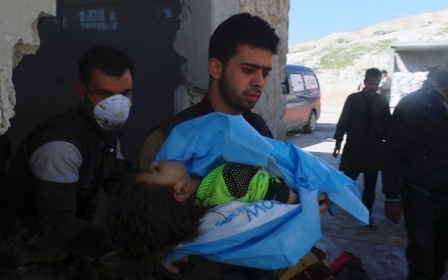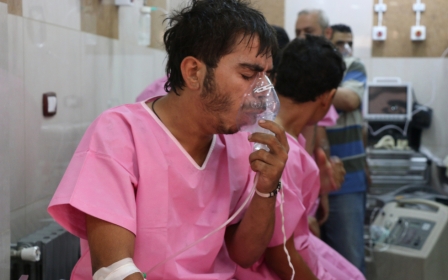US not ruling out military strikes after new chemical attacks in Syria: Official

The Trump administration is prepared to again take military action against Syrian government forces if necessary to deter the use of chemical weapons and is concerned they may be developing new methods to deliver such weapons, senior US officials said on Thursday.
Forces loyal to Syrian President Bashar al-Assad have continued occasional use of chemical weapons in smaller amounts since a deadly attack last April that drew a US missile strike on a Syrian air base, the officials told reporters in a briefing.
If the international community does not act quickly to step up pressure on Assad, Syria's chemical weapons could spread beyond Syria and possibly even to the United States, one of the officials said, speaking on condition of anonymity. "It will spread if we don't do something," the official warned.
In late January, rescue workers in a rebel-held enclave east of Damascus said government forces had again used chlorine gas, and the Syrian Observatory for Human Rights said at least 13 people had suffered suffocation.
The White Helmets civil defence rescue force, which operates in rebel-held parts of Syria, said 13 civilians including women and children had been "injured after (the) Assad regime used chlorine gas in Douma city in Eastern Ghouta".
The EU last year blacklisted over a dozen high ranking Syrian military officials and scientists over chemical weapons attacks on civilians inside Syria.
At least 20 civilians were killed Thursday in Syrian government air strikes on rebel-held territory in the country's north, a war monitor said.
Elsewhere three children were reported killed in artillery strikes on rebel-held Eastern Ghouta, while state news agency SANA said seven people died in apparent retaliatory shelling of nearby government-held Damascus.
The aerial bombardments in the north pounded several areas in the provinces of Aleppo and Idlib, where government troops are waging a Russian-backed assault against rebels and militants.
Constitutional changes
Separately on Thursday, Syria’s opposition said it would cooperate with proposals made at a Russia-hosted conference this week to rewrite the country's constitution as long as the process remains under UN auspices.
Participants at Tuesday's meeting in the Black Sea resort of Sochi in Russia - which is a powerful supporter of Assad - agreed to set up a committee to change the Syrian constitution, and called for democratic elections.
The main Syrian opposition negotiating group had boycotted the gathering, while the United States, Britain and France also stayed away because of what they said was the Syrian government's refusal to properly engage.
However, chief opposition negotiator Nasr Hariri said the Syrian Negotiation Commission would "work positively" with the proposed committee because responsibility for setting it up had been handed to the UN Syria envoy, Staffan de Mistura.
'If the constitutional committee is set up... within the UN process in Geneva, strictly consistent with UN resolution 2254, yes we will continue to work with the UN process in this regard'
- Nasr Hariri, chief opposition negotiator
"If the constitutional committee is set up... within the UN process in Geneva, strictly consistent with UN resolution 2254, yes we will continue to work with the UN process in this regard," he told a news conference.
Damascus welcomed the results of the Sochi meeting.
"The final statement of the conference confirmed the consensus of Syrians on ... preserving the sovereignty and unity of Syrian territory and people, and the exclusive right of the Syrian people to choose their own political and economic system," the Foreign Ministry said in a statement.
It made no mention of the decision to set up a committee to rewrite the constitution or the call for democratic elections.
Four years of on-off United Nations-mediated peace talks have yielded little progress toward ending the seven-year war, but De Mistura has pressed ahead with efforts for a political solution.
He said on Tuesday the constitutional committee agreed in Sochi "will become a reality in Geneva", where most of the UN-led Syria peace talks have been held. De Mistura also said he would decide the criteria for committee members and select about 50 people - from government, opposition and independent groups.
New MEE newsletter: Jerusalem Dispatch
Sign up to get the latest insights and analysis on Israel-Palestine, alongside Turkey Unpacked and other MEE newsletters
Middle East Eye delivers independent and unrivalled coverage and analysis of the Middle East, North Africa and beyond. To learn more about republishing this content and the associated fees, please fill out this form. More about MEE can be found here.




